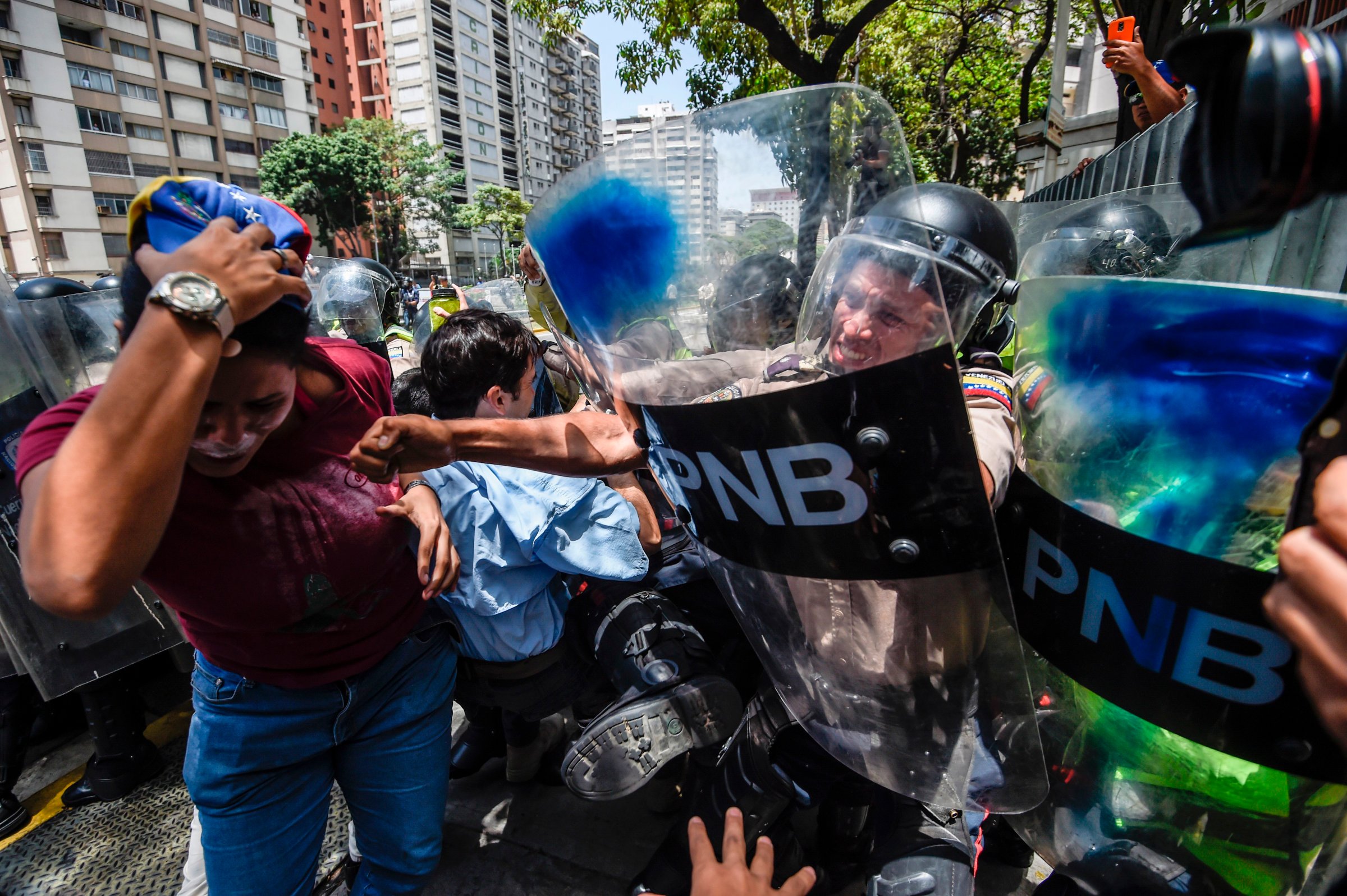
Venezuelan security forces quelled masked protesters with tear gas, water cannons and pepper spray in Caracas on Tuesday after blocking an opposition rally against socialist President Nicolas Maduro.
The clashes began after authorities closed subway stations, set up checkpoints and cordoned off a square where opponents had planned their latest protest against autocratic government and a crippling economic crisis.
In cat-and-mouse skirmishes on backstreets and highways around the capital, youths built barricades, burned trash and hurled rocks and bottles at soldiers and police. Various opposition leaders organized roadblocks.
Police used pepper spray on National Assembly head Julio Borges, two-time presidential candidate Henrique Capriles and rights activist Lilian Tintori, as they led protesters onto highways and jostled at barricades, witnesses said.
Opposition activists said armed pro-government gangs joined the fray and opened fire. “About 50-100 guys arrived on bike and started to shoot in the air,” protester Bernardo Sanchez told local media, saying a bullet had lodged in his thigh.
Read More: A Visual Record of Venezuela’s Collapse
In one street, kneeling women sang the national anthem as neighbors banged pots and pans from nearby buildings in a show of anger against a government they blame for a deep recession that has led to shortages of food and basics.
“We’re going to get rid of them but we have to fight,” said Jose Zapata, 57, an electrician, as he marched with a stick in his hand.
Overlooking one wide avenue, some pro-Maduro residents in a state housing project threw trash onto protesters below.
With thousands out on both sides, supporters of the 54-year-old president organized their own rally, in a volatile scenario seen constantly during the 18 years of leftist rule in the South American nation.
“They want an intervention in Venezuela,” said Prisons Ministry worker Juan Aponte, 34, who wore the red colors of the ruling Socialist Party.
Protests also were staged in other cities and more are planned across the country for Thursday.
The government accuses opposition parties of abetting a U.S.-led plot to topple Maduro, who has ruled Venezuela since the 2013 death of Hugo Chavez.
International Pressure
Tensions have soared in the oil-producing country’s long-running political standoff after the pro-Maduro Supreme Court last week annulled the opposition-led congress’ functions.
Although the court retracted that ruling over the weekend, the National Assembly remains powerless due to previous court judgments.
The renewed instability sent Venezuelan bonds lower, with the benchmark 2027 paper’s price down 4.4 percent.
Foreign pressure on Maduro has risen as opposition protests resumed late last week.
“Here the world can see the dictatorial path Mr. Maduro has chosen,” Capriles said.
Maduro says the U.S. government and other foes are whipping up hysteria against him to lay the ground for a coup.
“From the north [the United States], they give the order to the defeated fascist right of Venezuela to fill the streets with violence and blood,” Maduro said on state TV.
“In Caracas, in Venezuela, peace has triumphed once again.”
Read More: The 5 Countries That Illustrate the Decline of the Latin American Left
Maduro’s administration is particularly furious with Organization of American States head Luis Almagro, who is leading regional condemnation.
The regional bloc on Monday urged Venezuela to restore congress’ authority and guarantee separation of powers, but Venezuela’s representative walked out, as did the envoy from fellow leftist Bolivia, which holds the OAS presidency.
“The OAS has surpassed itself in aggression against Venezuela,” Maduro said late on Monday. “It is a real court of inquisition, carrying out abuses and vulgarities.”
Venezuela’s opposition won a National Assembly majority in late 2015 but the Supreme Court has overturned almost all its measures.
Due to the chaos in Caracas, the legislature postponed until Wednesday a session to censure the “rupture” of Venezuela’s constitution. Legislators also plan this week to start proceedings to remove Supreme Court judges but that would only be a symbolic rebuke since congress has no power to act.
More Must-Reads From TIME
- The 100 Most Influential People of 2024
- How Far Trump Would Go
- Why Maternity Care Is Underpaid
- Scenes From Pro-Palestinian Encampments Across U.S. Universities
- Saving Seconds Is Better Than Hours
- Why Your Breakfast Should Start with a Vegetable
- Welcome to the Golden Age of Ryan Gosling
- Want Weekly Recs on What to Watch, Read, and More? Sign Up for Worth Your Time
Contact us at letters@time.com